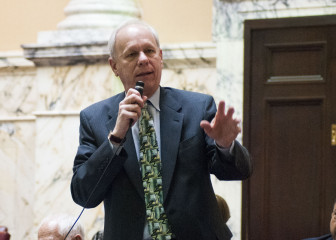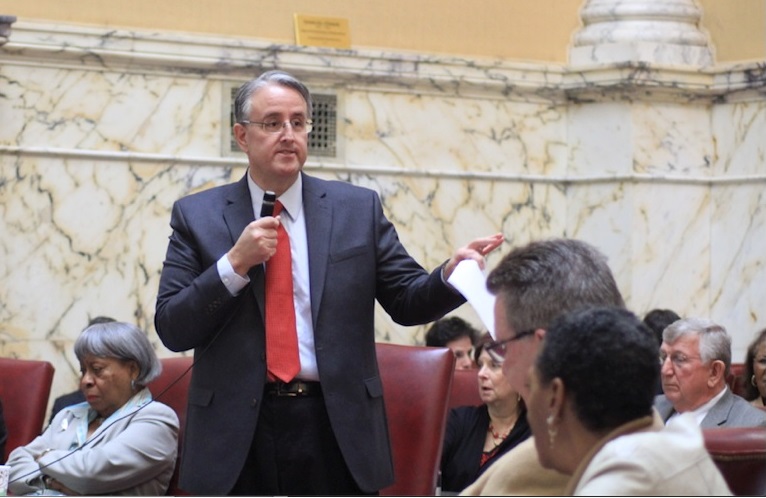MarylandReporter.com and Capital News Service
Democrats in the Maryland General Assembly on Tuesday passed legislation establishing parameters for school evaluations that the state school board strongly opposes and Gov. Larry Hogan has promised to veto.
The House went along with Senate amendments, and sent the bill to Hogan, who called it “an utter disgrace.”
If the bill is delivered to Hogan’s office by Monday, he has six days to act on it, giving the legislature the chance to override a veto before it adjourns April 10. It is one of several bills Democratic leaders hope to send to Hogan in time to override promised vetoes.
The Protect Our Schools Act would set standards for a plan to improve student outcomes that the state must submit to the U.S. Department of Education under the 2015 Every Student Succeeds Act (ESSA).
The sticking point for Hogan and GOP lawmakers is that the bill does not sufficiently weigh academic achievement when assessing schools. In that case the state could lose nearly $250 million in federal funding, a legislative analyst suggested.
Advocates for the teachers union scoffed at the notion the Trump Department of Education would reject any state plan, since ESSA gives much wider latitude for the states to set policy than under No Child Left Behind, the federal law it replaced.
The bill also restricts the state Department of Education’s ability to intervene in failing schools, which opponents worry is intended to limit the creation of charter schools and voucher systems.
Academic indicators raised
The bill specifies which measures could be considered when determining a school’s quality and prohibits student testing from being one of them. As introduced, the academic indicators amounted to 55% of the total score for a school, but the Senate raised that to 65% Tuesday and the House accepted the amendment.
“Members of the legislature just voted to trap thousands of our kids in failing schools and jeopardize over a billion dollars in education funding over the next five years – all to protect the teachers unions and preserve the unacceptable status quo,” Hogan said in a press release. “It’s an utter disgrace and one of the most irresponsible moves our legislature has ever made.”
Republicans opposed the bill largely on the grounds that it undermines school choice and makes it more difficult for students in struggling schools to get an effective education.
Several Republicans expressed concern that the bill would prevent the state from improving struggling schools for several years. Senate GOP leader J.B. Jennings attempted a filibuster, but the Democratic majority limited debate after about 15 minutes.
Concern about charter schools and privatizing

Sen. Paul Pinsky
Sen. Paul Pinsky, D-Prince George’s, defended the bill, saying emphatically that it “does not remove charter schools” and that it only prevents the state board of education from approving charter schools without local input. However, he also said that part of the motivation for the bill is a concern that some leaders in the state department of education want to privatize schools, introduce vouchers, and “destroy our public school system.”
The State Board of Education, now dominated by Hogan appointees, held an emergency meeting last week to reinforce its earlier opposition to the legislation, which preempts its role in setting policies to implement ESSA that it has been working on for over a year.
Sen. Steven Hershey, R-Upper Shore, described the bill as part of a “battle between the school board and the teachers’ union” and said he was “not convinced that this entire body knows what it’s doing.”
He proposed an amendment that would have delayed the effects of the bill until five other specific states with highly ranked education systems come forward with similar plans; the amendment was rejected. This amendment was modeled on a Democratic redistricting reform measure that also required action by five states, which Republicans had derided as an excuse to do nothing about gerrymandering.
Sen. Rich Madaleno, D-Montgomery, insisted “this is not a partisan issue, this is not about who is president or who is governor.”
“This is our one chance to in fact be a national leader to set up the most comprehensive set of standards to determine how schools succeed and how they don’t,” Madaleno said.
Baltimore City schools were repeatedly cited as examples of places where students would benefit from being able to move out of struggling public schools and into charter schools or, through a voucher, pay down the cost of a private school.
Sen. Nathaniel McFadden, D-Baltimore, a former school administrator, defended the Baltimore public school system, saying that “they may not have succeeded to the extent that some would like to see but our efforts are strong.”




All of this so that Smarick and Finn can keep rolling in the dough. I think the Governor has done a great job with budgets and shifting monies, but his education policies just plain stink. If the Governor is a smart man, he may want to start listening to his constituents, most of whom have children in traditional public schools. The Gov is spewing the nonsense of Finn and Smarick and I don’t think he has a clue what parents really want for their children. The results of a K-12 public education should be to turn out good, well rounded citizens for the next generation…not drones for the workforce.